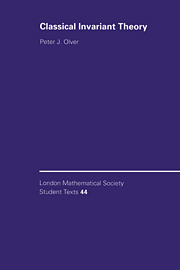Book contents
- Frontmatter
- Contents
- Introduction
- 1 Prelude — Quadratic Polynomials and Quadratic Forms
- 2 Basic Invariant Theory for Binary Forms
- 3 Groups and Transformations
- 4 Representations and Invariants
- 5 Transvectants
- 6 Symbolic Methods
- 7 Graphical Methods
- 8 Lie Groups and Moving Frames
- 9 Infinitesimal Methods
- 10 Multivariate Polynomials
- References
- Author Index
- Subiect Index
9 - Infinitesimal Methods
Published online by Cambridge University Press: 08 January 2010
- Frontmatter
- Contents
- Introduction
- 1 Prelude — Quadratic Polynomials and Quadratic Forms
- 2 Basic Invariant Theory for Binary Forms
- 3 Groups and Transformations
- 4 Representations and Invariants
- 5 Transvectants
- 6 Symbolic Methods
- 7 Graphical Methods
- 8 Lie Groups and Moving Frames
- 9 Infinitesimal Methods
- 10 Multivariate Polynomials
- References
- Author Index
- Subiect Index
Summary
As Lie first discovered, the true power of Lie group theory lies in the ability to work on an infinitesimal level. Each Lie group-theoretic object and property has an infinitesimal counterpart. Passage from the finite to the infinitesimal typically leads to a linearization of the underlying conditions, and hence a significant simplification. Moreover, as long as the group is connected, one can always reconstruct the finite object and its properties from their infinitesimal analogs. The resulting combination of group theory and analysis has proven to be exceptionally potent. A striking example is the Killing-Cartan classification of simple Lie groups, [126, 32, 53], which was established over a century ago and forms a (short) part of many textbooks on the subject, [173, 223]. The corresponding problem for simple finite groups was only recently completed and required the arduous labor of many researchers; moreover, the proof runs to thousands of journal pages, cf. [91].
The infinitesimal counterpart of a Lie group is known as a Lie algebra, an algebraic object of independent interest and wide applicability, ranging from physics to abstract algebra. When the group acts on an open subset of Euclidean space, or, more generally, a smooth manifold, the “infinitesimal generators” in the Lie algebra are realized as first order differential operators acting on smooth functions. Our primary focus will be on the infinitesimal approach to invariants and symmetry, leading to the fundamental differential operators which annihilate the invariants and covariants. Interestingly, Cayley, [41], realized the importance of these operators in the context of binary forms many years before Lie arrived on the scene.
- Type
- Chapter
- Information
- Classical Invariant Theory , pp. 198 - 227Publisher: Cambridge University PressPrint publication year: 1999



